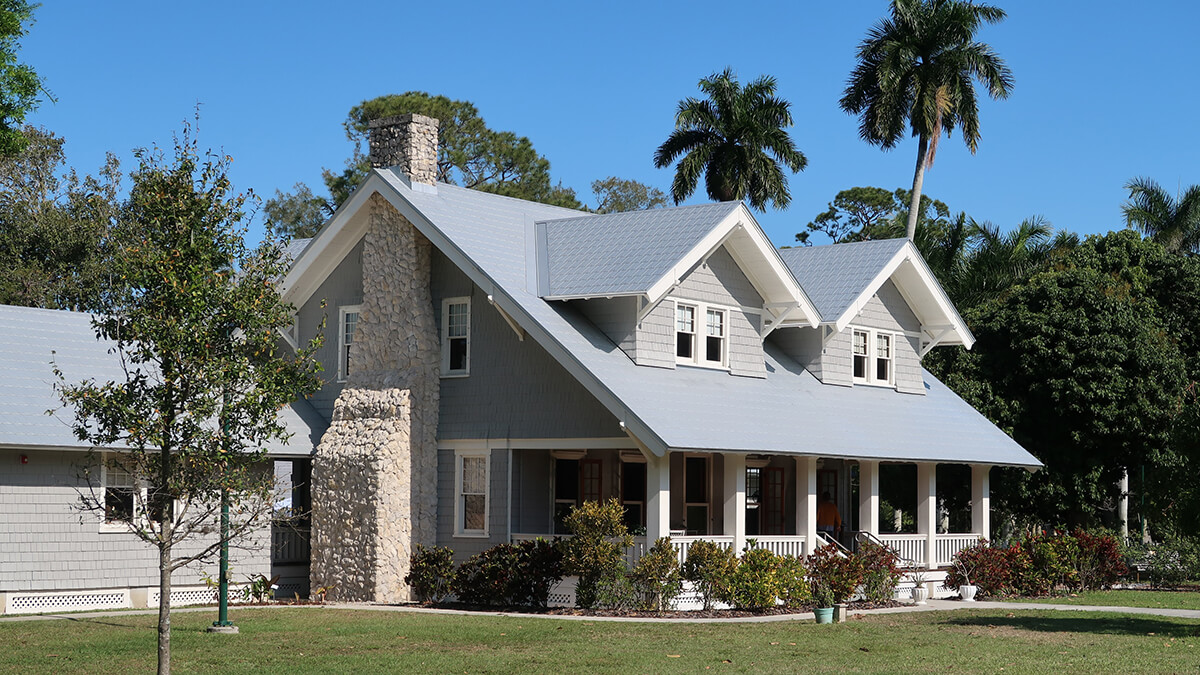The Florida housing market is constantly shifting, with new real estate trends coming and going this year and beyond. As the Florida real estate market changes, homeowners looking to sell or buy homes in Florida must stay on top of the latest changes in real estate to ensure they buy and sell at the best time possible.
The Florida real estate market also significantly impacts the state’s economy. The National Association of Realtors estimates that the real estate market in Florida accounted for 24.1% of the gross state product in 2023, and the market will likely continue playing a big part in how the state maintains its economic well-being.
Simply put, the Florida housing market is incredibly important, and understanding this market can help homeowners thrive when it comes time to sell their homes. However, with trends like a downturn in the number of properties sold, the future of the Florida real estate market is uncertain. If you want to buy or sell your Florida home, this guide is for you. Read more to find out everything about the Florida housing market, including current trends, property values, and what the future holds for buyers and sellers alike.
Table of contents
Discover your home’s worth online for free in minutes!
Florida Housing Market: The Historical Context
Historical trends in the Florida real estate market show the importance of this sector on the state’s overall economy. Over the years, Florida housing prices have shifted significantly and remained somewhat volatile. Let’s take a look at a few key trends in recent years.
The current percentage of homes sold above list price in Florida is 10.8%, dropping year-over-year by 1.4 points. For context, the number of homes sold above the list price in Florida peaked in April 2022, with 43.7% of properties selling for more than the asking price and a year-over-year increase of 17 points. January 2019 had the lowest percentage of homes sold above the list price in the previous five years, with only 9.6% of properties going for higher than the asking price and a year-over-year decrease of 0.84 points.
Furthermore, the number of Florida homes with price drops has fluctuated significantly over the previous five years. As of September 2023, the percentage of homes with price drops hit 28.4%, with a year-over-year decrease of 0.67 points. The percentage of homes with price drops peaked in August 2022, with 32.9% of homes with price drops and a year-over-year growth of 14.8 points. It reached its lowest number in February 2022, with only 10.9% of homes with price drops and a year-over-year decrease of 1.6 points.
The sale-to-list price in the Florida real estate market has also shifted in recent years but has remained far more stable than the number of properties sold above the listing price and homes with price drops. The current sale-to-list price is at 96.7%, with a year-over-year decrease of 0.16 points. In April and May 2022, this number peaked with a 100.5% sale-to-list price and a year-over-year growth of 1.9 and 1.4 points, respectively. In recent years, the sale-to-list price was its lowest in January 2019, with a sale-to-list price of 96.2% and a year-over-year decrease of 0.064 points.
Comparison With National Trends
So, how does the Florida real estate market measure up in comparison to other national markets? While Florida is considered to have the nation’s strongest housing market, it is not the only thriving real estate market in the United States. Below is a breakdown of the economic impact of real estate across ten key states according to the National Association of Realtors.
| State | Gross State Product (2023) | Total Economic Impact | Income Generated From Real Estate Industries |
| Florida | $381.4 billion/24.1% | $123,000 | $34,490/28% of total impact |
| South Carolina | $64.8 billion/20.1% | $108,500 | $30,150/27.8% of total impact |
| Maine | $17.8 billion/19.5% | $155,500 | $44,250/28.5% of total impact |
| North Carolina | $129.8 billion/16.9% | $114,500 | $31,930/27.9% of total impact |
| Georgia | $152.3 billion/18.9% | $117,600 | $32,880/28% of total impact |
| Indiana | $76.1 billion/15.3% | $89,600 | $24,450/27.3% of total impact |
| New Jersey | $156.3 billion/19.5% | $145,400 | $41,230/28.3% of total impact |
| Ohio | $135 billion/15.5% | $76,500 | $20,530/26.8% of total impact |
| Wisconsin | $66.5 billion/16.1% | $104,100 | $28,810/27.7% of total impact |
| Alabama | $48.7 billion/16.2% | $84,300 | $22,860/27.1% of total impact |
Impact of Significant Events
When considering the Florida housing market, you must also factor in significant events that have likely contributed to shifting trends in Florida real estate. Historically, the Great Recession of 2008 had the hardest hit on Florida’s economy, particularly in Southwest Florida. Florida’s Fort Myers and Cape Coral areas were the hardest hit nationwide during this period, with foreclosure rates skyrocketing.
Additionally, the Great Recession impacted other areas of the state, with over 40,000 foreclosures filed in homes in Lee County in 2008. In Collier County, over 9,000 foreclosures were filed in the same year. Despite these drastic downturns, Florida has managed to pick itself back up in the years following the Great Recession and is considered a highly profitable market.
The Florida housing market has also been affected by natural disasters like Hurricane Michael in 2018 – however, this impact isn’t necessarily in the way you might expect.
While 18 to 32 percent of residential property sales are estimated to be delayed in the month of a natural disaster, the Florida housing market sometimes experiences increased property demand following disasters. Many investors seek opportunities when homeowners want to sell their homes and leave the affected area.
In the wake of natural disasters, many people also seek property that wasn’t damaged during the disaster, particularly for people whose properties were damaged but who need a place to stay in the area. There are some indicators that, following natural disasters, there’s an increase in Florida housing prices as homes are remodeled and renovated to enhance their overall quality and worth.
Overview of Current Market Conditions and Florida Housing Prices
The Florida housing market conditions have remained relatively stable throughout 2024. According to Redfin, the median residential home sales price for Florida homes in 2024 is $407,700, with a year-over-year growth rate of 4.5%. Additionally, an February 2024 report from Florida Realtors states a median sale price for Florida homes of $415,000, with an average sale price of $585,701. As of February 2024, there was a year-to-date total of 19,040 closed home sales.
Additionally, as of February 2024, the number of new property listings reached 32,557, significantly more than the 24,373 added in February 2023. The number of active listings is up 36.5% year-over-year.
The housing inventory levels in Florida’s real estate market have a year-to-date monthly average of 61,486 listings, with a percentage change year-over-year of 47.2%. The year-to-date monthly average for the months supply of inventory in the Florida housing market in 2023 is 2.8 months.
The demand and supply dynamics of the Florida housing market are relatively stable in 2023, with 141,619 homes for sale in Florida in September 2023. During this month, the total number of newly listed homes reached 40,277, up 10.1 year-over-year. Demand for Florida residential properties is also steady, with 14.8% of homes selling above the listing price in September 2023 – however, this number is down compared to previous years.
Regional Analysis
Florida real estate trends vary depending on the area. Homeowners are increasingly moving into Florida cities, with Orlando, Sarasota, Tampa, Cape Coral, and Miami currently in the top ten cities that people are moving to nationwide. With this significant increase in people choosing Florida as a place to live, it’s important to consider different Florida real estate market regions. Below is a breakdown of some key areas in Florida where real estate is making a massive impact.
Miami
While many people are moving to Miami, the Miami real estate market is not the most competitive in Florida. According to Redfin, Miami home prices in September 2023 were up 5.5% compared to the previous year. The median sales price for properties in Miami as of September 2023 was $568,750, with a total number of 524 homes sold in Miami during the month. Homes in Miami take about 57 days to sell, and multiple offers on properties are rare. The average Miami home sells for 4% less than the listing price. Because of these factors, Miami is not as stable a market as other areas in Florida.
The sale-to-list price in Miami is currently 96.8%, with a year-over-year increase of 0.6 points. Though the average home sells for less than the listing price, an estimated 16.2% of Miami houses sell for more than the listing price. An estimated 16.7% of properties experienced price drops as of September 2023.
New York homebuyers were most likely to search for homes to move into in Miami compared to any other metro, while 77% of Miami homeowners planning to move were looking in places within the Miami metropolitan area.
Orlando
The Orlando real estate market is somewhat competitive compared to other Florida markets. The current median sales price for Orlando homes is $355,000, down 1.1% compared to the previous year. The number of total homes sold in September 2023 was 529, down 6.4% year-over-year.
Compared to cities like Miami, homes in Orlando tend to sell much faster, with a median time on the market of 20 days. Homes in Orlando are also likelier to receive multiple offers than properties in Miami. Orlando real estate’s sale-to-list price is 97.4%, with a year-over-year decrease of 0.87 points. The average Orlando home sells for 2% below the listing price, while 21.2% of properties sell for more than the listing price. 35.1% of homes for sale in Orlando experienced price drops in September 2023, up 3.4 points year-over-year.
Like Miami, New York homebuyers were the most likely group to consider moving to Orlando compared to any other metro. 66% of Orlando homebuyers moving properties looked to stay within the Orlando metropolitan area.
Tampa
The housing market in Tampa is also somewhat competitive, and Tampa is one of the major cities that people nationwide are moving into. The median home sales price for properties in Tampa is $415,000, up 6.4 percent compared to the previous year. Additionally, the number of homes sold in Tampa during September 2023 was 542, up 10.4% year-over-year. Tampa homes spend a median of 22 days on the market, down 1 point year-over-year.
The average home in Tampa sells for 2% below the listing price and goes pending in about 18 days. Houses selling above the listing price in September 2023 reached 20.3%, down 2.1 points from the previous year. The sale-to-list price for Tampa properties rests around 97.6%, while the estimated amount of homes with price drops in September was 37.5%.
Like Miami and Orlando, most people looking to move into Tampa were New York homebuyers. 68% of Tampa homeowners seeking a new property planned to stay within the Tampa metropolitan area.
Jacksonville
Jacksonville’s housing market is considered somewhat competitive, according to Redfin. Houses in Jacksonville typically receive an average of three offers and sell in 38 days after listing. The median home sales price in Jacksonville was $301,395 in September 2023, up 0.5% from the previous year. A total of 1,097 residential properties were sold in September, down 2.4% from the previous year.
In Jacksonville, the average home sells for about 2% below the listing price and takes about 35 days to go pending. Homes selling above the asking price in September 2023 totaled 17.1%, down 2.7 points year-over-year. The total percentage of homes with price drops in this period was 39.9%, down slightly from the previous year.
Like the other areas mentioned above, most homebuyers looking to move into Jacksonville from another area were from New York. People living in Jacksonville are generally satisfied with their city, as an estimated 72% of Jacksonville residents moving to a new property planned to stay within the Jacksonville area.
Demographic Factors
Many people are moving into Florida, particularly areas like Miami, Orlando, Cape Coral, Tampa, and Sarasota. The state’s population is rapidly expanding, with Florida currently the fastest-growing state. Between 2021 and 2022, Florida’s population increased by 1.9% to surpass Idaho, which was previously the fastest-growing state.
More and more people are migrating to Florida nationwide, with an estimated 26% of homebuyers looking to move to a new metropolitan area, with Florida leading the pack for places people are looking to move into. As the population in Florida continues to grow, market demand is also increasing. More and more homebuyers moving to Florida means the state has a considerable real estate demand that the supply can’t always meet.
Government Policies and Regulations
There are several real estate policies and regulations that can impact how you buy or sell real estate in Florida. Recently, Florida passed the Live Local Act, a historic law marking a new investment in affordable housing in Florida. This affordable housing is possible through a series of incentives for development, tax breaks, and up to $811 million in affordable housing funds.
As this law goes into effect, more and more affordable housing efforts will likely arise in Florida – something that’s increasingly important as Florida’s housing market becomes more valuable and expensive. The Florida real estate market is currently the second most valuable in the nation, beating out New York recently and only outvalued by California.
Challenges and Opportunities
There are numerous challenges and opportunities in the Florida housing market that homebuyers and sellers should consider as they navigate Florida’s real estate landscape. Let’s take a closer look at some of the main considerations to keep in mind when approaching the Florida real estate market.
Challenge: Housing Affordability
Housing affordability is one of the primary challenges homebuyers face in the Florida real estate market. The Shimberg Center for Housing Studies found the following to be true about affordability in the Florida housing market:
- Between 2011 and 2022, Florida’s median single-family housing price rose 91%.
- Between 2012 and 2021, Florida added close to 600,000 units with gross rents exceeding $1,000 and lost close to 277,000 units renting for less than $1,000.
- Florida has 26 affordable housing units available for every 100 households with incomes between 0-30 percent of the area median income (AMI).
- 825,990 low-income renters in Florida must pay over 40% of their total income for housing purposes.
Challenge: Strain on the Housing Supply
The massive demand for housing in Florida has also caused issues with supply and demand, and as more people move to Florida, the housing supply will continue to be strained and struggle to keep up with growing demand. A few contributing factors, including rapid population growth, large amounts of vacation rentals, and limited land availability, cause the strain on the Florida housing market.
As more properties are purchased and developed, Florida faces limited land availability for new housing development, particularly in coastal areas. Additionally, despite the Live Local Act, a significant affordable housing shortage in Florida is putting additional supply strain on low-income families. The increased demand for affordable housing is not being met rapidly enough to accommodate families in need of financial assistance.
Challenge: Calls for Sustainable Development
More and more homebuyers are emphasizing the need for sustainable housing, and with limited land available for housing development, meeting this need will continue to be a challenge for the Florida housing market. Sustainable development is especially important because of Florida’s environmental vulnerability, as the state is susceptible to natural disasters.
Greater environmental risks mean that homebuyers moving into Florida from outside the state expect robust protections in place in their new properties, and without resilient construction, some buyers might hesitate to move forward with real estate transactions.
Investment Opportunities
Despite some of the challenges in the Florida real estate market, there are also numerous opportunities for investors seeking to invest in a profitable environment. Some investment opportunities you might consider if you’re interested in investing in Florida housing include:
- Tourism and vacation rentals
- Residential real estate like single-family homes, condominiums, and townhouses
- Waterfront properties
- Real estate development and new construction projects
- Florida Opportunity Zones
Future Outlook
So, what trends can you expect to see in future years in the Florida real estate market? Currently, experts do not predict a housing market crash in Florida, though some claim nationwide concerns for a market crash. The Florida market might face a cooldown but is unlikely to experience significant damage compared to other markets with less demand.
Additionally, the future of the real estate market in Florida largely depends on specific regions. Cities like Miami, Orlando, Tampa, and other high-demand areas are likely to be more recession-resistant than other parts of the state, particularly in rural areas.
The median sales price of Florida properties is likely to continue increasing year-over-year as it has steadily grown within the past five years. Despite this, the number of homes sold in Florida is relatively volatile within the previous five years and will likely continue this way.
Discover iBuyer.com
The Florida housing market is highly profitable and has plenty of opportunities for homebuyers and sellers alike. From its historical to its modern-day success, the Florida real estate market shows no signs of slowing down in upcoming years, even as other markets might face housing crises.
iBuyer.com helps you sell your home fast. With iBuyer.com, you can get instant offers on your home from the top Florida iBuyers out there. Visit iBuyer.com today to submit your home address and get a free cash offer to sell your house!




